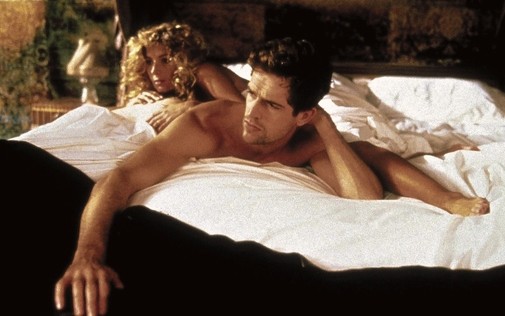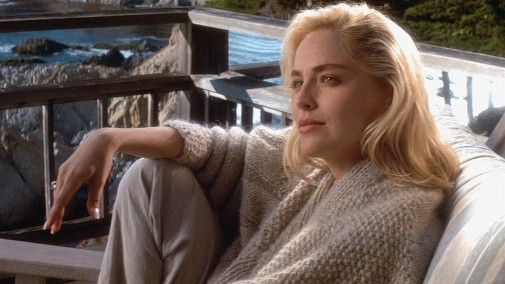 THE COMFORT OF STRANGERS (1990) Paul Schrader
THE COMFORT OF STRANGERS (1990) Paul Schrader
The last time we checked on the Criterion Channel's Erotic Thrillers collection, it was to consider the voyeuristic properties of late-80s cinema. Moving on to the next decade, let's get over the nineties in one go. During this era, the erotic thriller reached its apotheosis of influence and trashiness, gradually fading into obsolescence as the millennium approached. It was an epoch of Fatal Attraction copycats and prestige-infused sensuality, a final resurgence of neo-noir aspirations, the rise and fall of Joe Eszterhas, Sharon Stone's stardom, and direct-to-video sleaze. Criterion traces these arcs through eleven titles, spotlighting great cinema and irredeemable garbage with the same gusto…
It all starts on the French Riviera, at the 1990 Cannes Film Festival, when Paul Schrader's Pintor-penned The Comfort of Strangers premiered out of competition. Following an English couple as they vacation in Venice, the drama considers the vice of coveting what's beautiful. Such desires can manifest in many ways, but the Bresson-loving director is primarily preoccupied with the twinned impulses to consume and destroy. It's when your hand reaches for an Adonis' silk-smooth skin, but instead of caressing, you scratch a bloody streak. Rupert Everett is our object of unfathomable beauty, beloved by the camera that kisses his every inch with religious reverence.
Allied to the perspective of his lover and the monsters around them, the viewer learns to recognize that gut feeling that tells you to eliminate what is most alluring, for their pull is too much to bear. It hurts to live in the presence of something so beautiful, yet it also feels good - oh, so sweet a paradox. Christopher Walken and Helen Mirren embody the conflicted contradiction as if manifesting Schrader's oversexed chastity, violence with an epicurean twist. They are our beguiling points of identification, upsetting as that thought might be, and provide the film with its wildest performative turns. Mirren, in particular, has rarely been more fascinating.
Old-world opulence rots into palimpsests of decay under Dante Spinotti's painterly gaze, all while Armani covers bodies in designs made to hint at the nakedness beneath, and Badalamenti rings a lament over the soundtrack. It's intoxicating cinema but also cryptic, a tease of obvious primordial urges reshuffled by the hand of those with high art on their minds. Storyless beyond its skeletal foundations, it sings the pleasure principle in a key that many will find pretentious beyond tolerance. For me, however, it hit just the right note. But, of course, for those looking for something more mainstream and subversive, there's always Basic Instinct.
 BASIC INSTINCT (1992) Paul Verhoeven
BASIC INSTINCT (1992) Paul Verhoeven
Part of Paul Verhoeven's 15-year-long mission to make American audiences choke on their Hollywood treats, the movie might have been born from Eszterhas woman-hating imagination, but its final form owes more to its director's rebellion. Though there's cruelty in how the Dutchman considers his leading lady, there's also a sense of admiration, even recognition - you can sense a similar situation decades later in Fincher's Gone Girl. The text of Basic Instinct points to novelist turned maybe-murderess Catherine Trammell as a figure of sensual amorality, worthy of a fuck and fright. The camera regards her as a manipulative equal.
Michael Douglas' rape-y trigger-happy detective Nick is certainly no hero, no matter what the actor might think. When sharing scenes with Sharon Stone, who can always find truth in trash, he's virtually squashed by her, obliterated and reduced to his rightful insignificance. Pathetic men around a goddess, these film's chauvinist pigs are the seedy underbelly of the noir genre turned upside down – they're also the target audience. Verhoeven, as ever, wants to shape his movie as a carnival mirror, reflecting and revealing the Puritanical stance behind so much of 1990s America's taste for blockbuster sexploitation.
Like the horned-up cop, this hypothetical spectator wants sex to be naughty and, to a certain degree, forbidden. That impulse leads to mythification while also pathologizing a human need. When Verhoeven presents the viewer with what they want but feel they shouldn't, the crosshairs of titillation and outrage get mixed up. All in all, it's a potent attack forever fated to confuse, to inspire countless reinterpretations, to be lauded and lambasted with equal fervor. Beyond such matters, it's also a nifty piece of cinema, maybe even Verhoeven's most formalistic perfect pictures, crowned by an Oscar-nominated Jerry Goldsmith score that couldn't possibly be more iconic.
Still, for all that one might applaud the European provocateur, Basic Instinct wouldn't work without Stone's pitch-perfect performance. She's the one who scavenges the mystery within the archetype, who imbues the entire exercise with an odd sort of legitimacy. For a similar dynamic in a lesser production, consider Barbet Schroeder's Single White Female, with Bridget Fonda and Jennifer Jason Leigh acting out a Fatal Attraction-prompted, Persona-adjacent bit of merging identities fuckery with sapphic shades. It's the story of a roommate from hell, told with a surprising sense of compassion towards its villain. Then again, that might be more Leigh's work than anything else behind the camera.
 SINGLE WHITE FEMALE (1992) Barbet Schroeder
SINGLE WHITE FEMALE (1992) Barbet Schroeder
The actress is staggering, somehow turning what could have been a mean-spirited cartoon into a tragic figure worthy of the movie's late-coming melancholy. Her take on the character is brittle bittersweet, a cracked porcelain doll whose broken pieces are razor-sharp, ready to make you bleed. But of course, while Leigh might be what makes Single White Female truly worthy of your watch, she's not its only highlight. Doing double duty as costume and production designer, Milena Canonero synthesizes a type of 90s NYC chic that's editorial-ready while still feeling grounded to the story. Then there's Luciano Tovoli's brightly-hued cinematography, every night shining azure, utterly anti-naturalistic, and all the better for it.
In contrast to those troubled triumphs, Katt Shea's Poison Ivy is an inexorable disappointment whose sexualization cum demonization of the titular teen feels like a premonition of how the American media would handle the Amy Fischer case years later. While there are clear attempts at prioritizing an adolescent POV, a feminine purview of salacious material, the project's rotten foundations give out. It doesn't help that Drew Barrymore is no Stone or Leigh, incapable of finding any inkling of truth hiding within the trash pile. The same goes for Nicholas Kazan's Dream Lover, a stylish affair undermined by Mädchen Amick's lackluster star turn.
At least, there's something to love about that movie's bald-faced cynicism, a crescendo of bitterness that culminated in an ending so venomous it boggles the mind. The Color of Night conclusion is similarly nutty, though also profoundly incompetent. That Richard Rush-directed stinker depends on a ludicrous final twist that further cheapens what, until then, had been an already daunting collection of contrivances. Not even Bruce Willis' full-frontal glory can save the mess, with only two points of interest prevailing. First, there's the not quite 'so bad it's good' score by Dominic Frontiere, a summation of all the worst erotic thriller aural trends of the time.
Second, you have a nymphomaniacal Lesley Ann Warren giving it all to a project that doesn't deserve her. The movie came out in 1994, the most represented year in this Erotic Thrillers program. From that vintage, we also have the direct-to-video double bill of Harry Hurwitz's Fleshtone and Donna Deitch's Criminal Passion. The former continues the mini-trend of exceptionally dated scores, though this one's put to better effect than Frontiere's Color of Night tunes. In part, it's because the movie flows in pseudo-oneiric logic as if floating in the breeze of fantasy, forbidden fetishes weaponized to screw over a painter, drive him into the heart of a grand conspiracy.
 CRIMINAL PASSION (1994) Donna Deitch
CRIMINAL PASSION (1994) Donna Deitch
It's a pity about the across-the-board bad acting because the film has immense potential. Unfortunately, Deitch's picture doesn't fare much better on that front. Criminal Passion has its value, however, especially when interpreted as a woman director's gender-bent take on Basic Instinct or perhaps a harkening back to 1985's Jagged Edge, both in dialogue with the AIDS epidemic whether intended or not. Joan Severance's performance is lacking, but her 90s butch fashions are on point, as is the unashamed objectification of her very own Catherine Trammel – John Allen Nelson at his hunkiest. Comparing the movie to its clear inspiration offers an exciting study on gendered models of eroticism, if nothing else.
This 1994 detour ends with a movie stuck somewhere between theatrical prestige and a made-for-TV release plan which deemed it ineligible for the Oscars. If not for that, maybe Linda Fiorentino would've nabbed a much-deserved Best Actress nomination, so great is her work in John Dahl's The Last Seduction. Alternating between premeditated calculation and on-the-fly lies, her Bridget is a femme fatale for the ages, heiress apparent to the legacy of Phyllis Dietrichson and her ilk. She's noir tradition perpetuated into the end of the century, made more explicit by a less restricted film industry, subtext made text.
 THE LAST SEDUCTION (1994) John Dahl
THE LAST SEDUCTION (1994) John Dahl
No wonder Fiorentino returned to this type of role time and time again, including in William Friedkin's Jade, a mirthless catastrophe not even she can salvage. If those pictures, tied by their genre and leading lady, represent a classic variation on old themes, other productions took a step further. The Wachowski sisters' debut feature exemplifies a neo-noir eager to transmute genre codes and gender roles. The directors tell that old lark about a wandering loner with a dark past who gets caught in the web of a beautiful woman. Together, they plan to double-cross her current beau, whether by theft or murder or something thornier. It's Double Indemnity, and The Postman Always Rings Twice – it's Bound.
The last title in the Erotic Thrillers series queers up the classic premise and further transforms the femme fatale by lacing her portrait with the honesty of a woman in love. As Violet, Jennifer Tilly fills the shoes of temptress while Gina Gershon is her new paramour, an ex-con that goes by Corky and tries her hand at renovating the apartment next door. Instant attraction blossoms into passion, lust complicated by affection, trust, by the hope of a happy ending that feels farther away with each movement in the stress-inducing plot. It's all surprisingly sincere while indulging in ultra-cool stylings, lies galore, much leather and lace.
You'll hardly find a sleeker movie, every space and costume perfectly curated according to a strict palette of grayscale, shiny black, white, and sanguine reds. It's disciplined to a degree the Wachowskis would never again strive for, the better to contrast with the plot's anxiety crescendo. That latter element is personified by Joe Pantoliano, the deeply undesirable mark who acts as a counterbalance to the main couple's brilliance. His is a performance of fine-tuned hysterics, a pool of flop-sweat coalesced in the shape of a chronically ill-dressed man. Watching the three actors circle each other is a spectacle in itself. Witnessing the cinematic engine that encapsulates them is even better, masterful like nobody's business.
 BOUND (1996) Lana Wachowski & Lilly Wachowski
BOUND (1996) Lana Wachowski & Lilly Wachowski
Though it was a rocky journey, our odyssey finishes on a high note - hooray! So now, looking back on all the films covered in this and other write-ups, what's your favorite Erotic Thriller of the bunch?